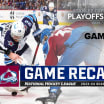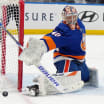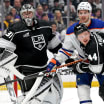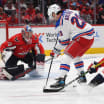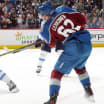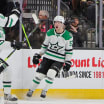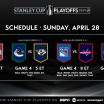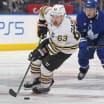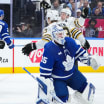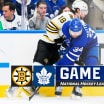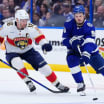Legendary hockey reporter Stan Fischler writes a weekly scrapbook for NHL.com. Fischler, known as "The Hockey Maven," shares his humor and insight with readers each Wednesday.
This week, Fischler reveals a few zany episodes involving goalies with the Washington Capitals during their early years in the NHL.
Maruk once requested to be emergency goalie for Capitals
50-goal scorer's plea one of many intriguing Washington stories recalled by journalist Fischler
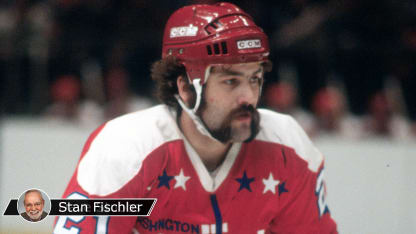
By
Stan Fischler
Special to NHL.com
Nobody ever said goaltending was easy. In fact, it often has been described as the toughest job in sports.
But perhaps no NHL goalies faced as many bizarre episodes as those who played for the Washington Capitals after they joined the NHL in 1974-75.
The following rank among the strangest goalie stories I've ever heard.
A CURIOUSLY REFRESHING TWO-GOALIE EXPERIMENT
During the 1976--77 season the Montreal Canadiens boasted one of the strongest teams in NHL history. They finished the season with 132 points, bolstered by no less than nine future Hall of Famers sprinkled across the roster. With that in mind, you can imagine how difficult it was for the middling Capitals to match up.
But prior to the Capitals game against the Canadiens on Jan. 8, 1977, Washington's coach Tom McVie came up with a unique plan.
"I had seen the Canadiens on TV against the [Philadelphia] Flyers," McVie told the Montreal Gazette. "They drilled 55 shots against Bernie Parent. I don't think there's a goaltender around who can withstand that kind of attack. Even Parent was beaten six times."
That's when McVie revealed his brainstorm. Summoning his two goalies, Bernie Wolfe and Ron Low, McVie told them they would be alternated every few minutes.
Needless to say each goalie was stunned.
"Right after he told us," Wolfe said, "I stopped thinking if I was going to be hot or cold.
"You'd just better be hot when you go in!"
The goalies agreed that despite the curious game plan they would not debate with their coach.
"Everything Tommy does," Low said, "is for the best."
As it happened, Low and Wolfe played a pair or shifts in the opening frame and didn't fare poorly. Out of 10 Montreal shots, only one went in. The 1-1 tie after the first 20 minutes made McVie's strategy look good. Watching from the press box, injured Montreal forward Jim Roberts commended McVie.
"I've never seen anything like this," Roberts told a reporter from the Washington Star. "But I admire what McVie is doing. It's good hockey."
But it wasn't good enough since the Canadiens proved to be equal opportunity scorers as the game wore on. They put four pucks past Wolfe on 26 shots and scored three goals against Low on 14 shots. Wolfe totaled 35 minutes in the crease; Low played the other 25.
"It had no bearing on the outcome," Wolfe said.
Glenn Dreyfuss, who authored "The Legends of Landover: Long Lost Stories of the Washington Capitals," had the perfect squelch, "Maybe the final score, 7-2, would have been different if Bernie and Ron had played together, side by side."
The indomitable McVie modified his two-goalie experiment two weeks later at The Forum and it was an improvement. Wolfe played the first two-thirds of the game while Low played the final period. Montreal scored five goals this time, but still won, 5-2.
A BACK UP WHO'D RATHER HAVE BACKED OFF
Typically, a backup goalie can't wait for the opportunity to enter a game. This was not the case when the Capitals played the Canadiens in Montreal on Feb. 14, 1981.
The problem was threefold for Capitals coach Gary Green. His goalies were suffering a hat trick of injuries.
In one form or another Wayne Stephenson, Dave Parro and Mike Palmateer were each injured ahead of the game. Stephenson knew he couldn't start because of a severe back condition. Only after management pleaded with him to serve as back up -- "You won't have to play," he said he was assured -- did Stephenson agree.
Parro started and everything was fine until Canadiens forward Guy Lafleur fired a shot at the goalie who made the save. But trying to regain his balance, Parro reinjured an already dislocated shoulder.
Green shuddered as Parro was helped off the ice. Staring at Stephenson, the coach got this reply, "I'm not going in; I'm not going in."
"The fact was that 'Steph' couldn't play but he had no choice," Dreyfuss said. "He did tell Green that there was no way he could bend over. Talk about your stand-up style of goaltending."
Stephenson stopped 13 of 15 shots in the 6-1 Montreal victory.
After the game, Green said he was considering two skaters who could put on the pads if Stephenson had to be replaced. The coach recalled that defenseman Pat Ribble enjoyed fooling around as practice goalie, so he was next in line.
"Then I looked down our bench and Pat was shivering, he had buried his head between his knees, terrified I'd tell him to get into the equipment," Green said.
Meanwhile, Washington's best forward, Dennis Maruk, who scored 356 goals in the NHL, including 50 that season, urged Green to let him play goalie.
There was no way the coach would risk losing his top scorer, however, and Maruk was denied the opportunity he craved.
Asked to describe that game, Green simply said, "What a comedy act!"
THREE GOALIE CHANGES IN ONE PERIOD WORKS
In a Capitals game at the Hartford Whalers on Feb. 2, 1986, coach Bryan Murray figured he made the right move by starting his number one goalie Al Jensen. But Murray changed his mind after Jensen allowed four goals in two periods. Rookie Bob Mason took over to start the third, his 15th NHL game.
Just like that the visitors got hot and within a seven-minute stretch scored four goals to tie the game. Something told Murray to make a move and he suddenly yanked Mason and re-inserted Jensen. But with six minutes remaining in the third period Jensen made a skate save and after the next whistle fell to his knee, unable to continue because of an injury. For the second time in the same period Mason was summoned to step in for the starter.
As the game clock ticked toward the one-minute mark, Capitals defenseman Larry Murphy scored to put Washington ahead, 5-4. They nearly blew that lead with 18 seconds left when Hartford's Kevin Dineen beat Mason but the shot ricocheted off the crossbar and harmlessly skittered into the corner.
Murray, who was notorious for his wry sense of humor, met the press after the win.
"When we were down, 4-3, we were playing to protect the lead," he said.
A puzzled reporter shot back, "Bryan, how can a team protect a lead it doesn't have?"
The coach thought for a second and then offered this simple explanation, "We knew we were going to win!"
